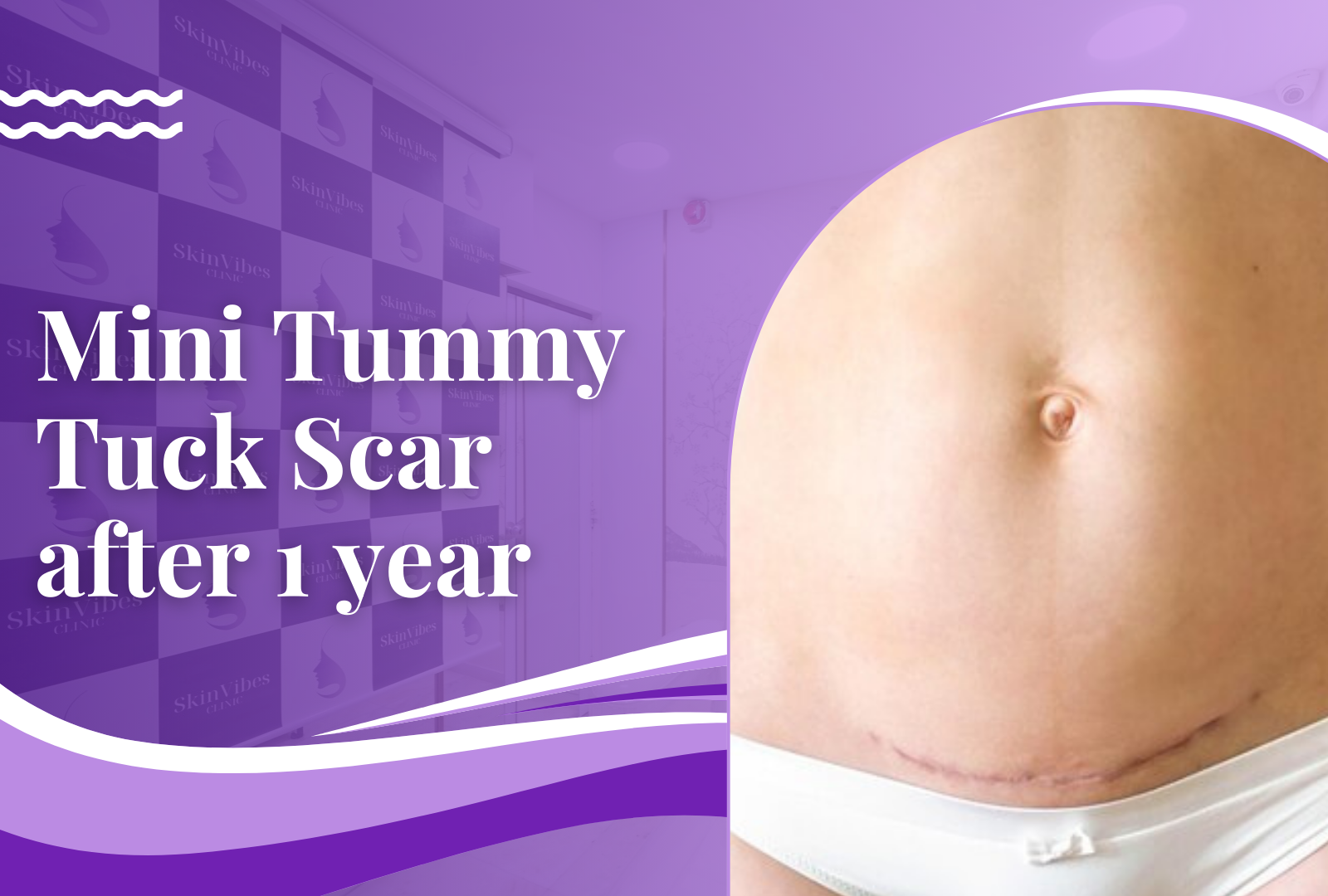
As we age, lifestyle changes, genetics, and pregnancy can lead to a stubborn belly bulge that refuses to go away despite diet and exercise. Thankfully, cosmetic advancements have made it possible to achieve a firmer abdomen, and more people are recognizing the benefits of a mini tummy tuck.
According to global statistics, cosmetic surgeries have been on the rise, with abdominoplasty ranking among the top procedures. A mini tummy tuck, a less invasive version of a full abdominoplasty, specifically targets the lower abdomen to remove excess skin and improve muscle tone.

“A mini tummy tuck is ideal for individuals who struggle with lower abdominal laxity. It removes excess skin, tightens muscles, and enhances body contours with a smaller incision. Over time, scars mature and fade, but how they heal depends on several factors, including skin type, post-operative care, and lifestyle choices.”
This blog will cover everything you need to know about a Mini Tummy Tuck Scar after 1 year, including its appearance, healing factors, treatment options, and when to seek medical advice.
What Does the Scar from a Mini Tummy Tuck Look Like?

Scars are a natural part of any surgical procedure, and a mini tummy tuck is no exception. After a year, the scar usually appears as a fine line just above the pubic area. Depending on individual healing, it may be pink, slightly raised, or blend into the natural skin tone.
In some cases, scars may still appear darker or textured, especially in individuals prone to hyperpigmentation or keloid formation. However, with proper care and time, the scar continues to fade and flatten over the following years.
What Does the Scar from a Mini Tummy Tuck Look Like?

With advanced techniques and the surgeon’s expertise, most people heal with minimal scarring. However, healing isn’t the same for everyone. Several factors impact how your mini tummy tuck scar looks after one year:
Skin Type & Genetics: Some individuals naturally produce more collagen, leading to thicker scars, while others may experience hyperpigmentation or slow healing.
Aftercare & Scar Management: Using silicone sheets and scar creams and moisturizing the incision can significantly improve healing.
Sun Exposure: UV rays can darken scars, making them more noticeable. Applying SPF 50+ daily helps prevent discoloration.
Smoking & Alcohol Consumption: Both slow down the body’s natural healing process, reducing collagen production and increasing scar visibility.
Tension on the Scar: Excessive movement or tight clothing can stretch the scar, affecting its final appearance.
Wondering if your scar is healing properly? Consult a seasoned plastic surgeon for expert guidance on scar management and treatment options.
Tips to Minimize the Appearance of a Mini Tummy Tuck Scar After 1 Year
Use Scar Creams & Silicone Sheets: These helps flatten and lighten scars when used consistently for a few months.
Regular Moisturization: Hydrated skin heals better. Use silicone-based gels or vitamin E creams to soften the scar.
Eat a Nutrient-Rich Diet: A diet rich in vitamins A, C, and E supports skin repair and collagen formation, leading to better healing results.
Avoiding Tight Clothing: Friction and pressure can lead to irritation and poor scar healing.
Scar Massage: Gently massaging the area improves circulation and breaks down scar tissue.
Protect from the Sun: UV rays can worsen scar pigmentation. Always apply sunscreen or keep the area covered.
Procedures to Help Improve the Scar After 1 Year

Several professional treatments can significantly improve the appearance of a mini tummy tuck scar even after a year:
Laser Therapy: Fractional laser resurfacing reduces pigmentation, smooths scar texture, and stimulates collagen production.
Microneedling: Creates tiny micro-injuries that stimulate collagen production, trigger healing, improve skin texture, and reduce scar depth.
Steroid Injections: Beneficial for raised or keloid scars, helping to flatten and soften their texture.
Chemical Peels: Exfoliate the skin’s surface, encouraging new cell turnover and reducing discoloration.
When Should I See a Doctor?
-
- Persistent redness, swelling, or pain
- Excessive thickening or raised scar formation
- Unusual discoloration or darkening over time
- Itching or irritation that doesn’t improve with care
- Any signs of infection, such as pus or warmth
- Delayed healing beyond expected timelines
According to Dr. Viral Desai, an acclaimed cosmetic surgeon in Mumbai:
“While some scarring is inevitable, you must not ignore unusual symptoms. Persistent discomfort, abnormal thickening, or color changes warrant professional assessment. Early intervention ensures the best possible outcome for aesthetics and overall skin health.”
Conclusion
A mini tummy tuck offers a transformative solution for those looking to refine their lower abdomen. While the scar is a natural part of the healing process, proper care can significantly improve its appearance.
Dr. Viral Desai, a renowned plastic surgeon, advises:
“Patience is key when it comes to scar healing. While natural fading occurs, proper care and advanced treatments can further enhance the results. If you’re concerned about your scar, professional guidance can make a significant difference in achieving a smooth and refined appearance.”
Wondering if your scar needs professional treatment? Consult an experienced plastic surgeon to explore effective treatments tailored to your skin type.
FAQs
How long does it take for a mini tummy tuck scar to fade?
Most scars typically improve for up to two years, gradually fading and flattening with proper care. Complete healing varies based on individual factors like genetics and aftercare.
Can exercise affect my scar’s healing process?
Strenuous activity too soon can strain the incision site. Gentle movement is recommended in the first few months to support proper healing.
Do all mini tummy tuck scars look the same?
No, scars vary based on skin type, healing ability, and surgical technique. Some may remain slightly raised, while others become barely visible.
Are there natural remedies for scar improvement?
Massaging the scar with vitamin E oil, aloe vera, or coconut oil may help keep it soft and less noticeable over time.
Can pregnancy affect my mini tummy tuck scar?
Yes, pregnancy can stretch the skin and may alter the appearance of the scar. Consulting a plastic surgeon before planning a pregnancy is advisable.
Disclaimer: The information shared in this content is for educational purposes only and not for promotional use.

